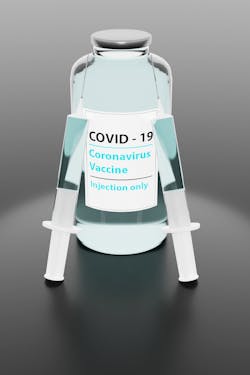EMA finds possible link to unusual blood clots with AstraZeneca COVID-19 vaccine
The safety committee of the European Medicine Agency (EMA) has concluded that unusual blood clots with low blood platelets should be listed as very rare side effects of Vaxzevria (formerly COVID-19 Vaccine AstraZeneca), the agency reported in a news release.
In reaching its conclusion, the committee took into consideration all currently available evidence, including the advice from an ad hoc expert group, the EMA said.
Separately, a Global Advisory Committee on Vaccine Safety from the World Health Organization (WHO) reviewed information from the EMA, the United Kingdom and other countries, and concluding that “a causal relationship between the vaccine and the occurrence of blood clots with low platelets is considered plausible but is not confirmed. Specialized studies are needed to fully understand the potential relationship between vaccination and possible risk factors.”
The EMA reminded healthcare professionals and people receiving the vaccine to remain aware of the possibility of very rare cases of blood clots combined with low levels of blood platelets occurring within 2 weeks of vaccination. So far, most of the cases reported have occurred in women under 60 years of age within 2 weeks of vaccination. Based on the currently available evidence, specific risk factors have not been confirmed.
The committee noted that the blood clots occurred in veins in the brain (cerebral venous sinus thrombosis, CVST) and the abdomen (splanchnic vein thrombosis) and in arteries, together with low levels of blood platelets and sometimes bleeding.
The committee carried out an in-depth review of 62 cases of cerebral venous sinus thrombosis and 24 cases of splanchnic vein thrombosis reported in the EU drug safety database (EudraVigilance) as of March 22, 2021, 18 of which were fatal. The cases came mainly from spontaneous reporting systems of the EEA and the UK, where around 25 million people had received the vaccine.
One plausible explanation for the combination of blood clots and low blood platelets is an immune response, leading to a condition similar to one seen sometimes in patients treated with heparin (heparin induced thrombocytopenia, HIT).





